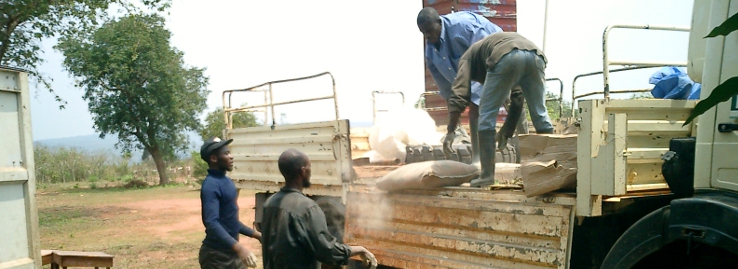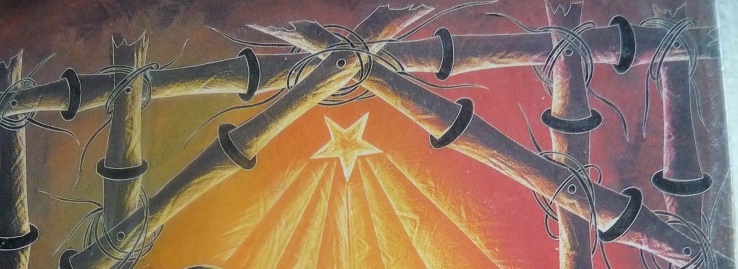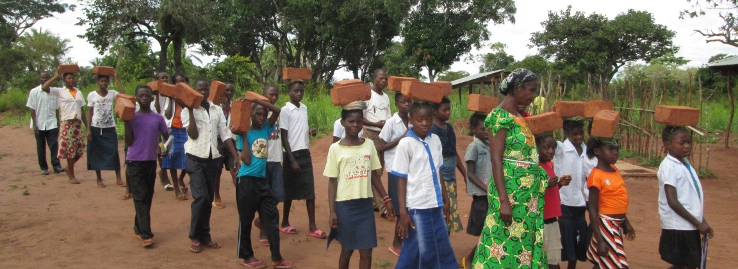Jens
Living and Working Together
On my way from Prague to Congo I left by snow and freezing weather. The plane had to wait for the runway to get cleared for takeoff. On the way out we had to stop as a special truck on each side sprayed the plane free from ice and snow. All this delayed our departure so that it was a question if I would get my ongoing flight in Frankfurt. Some people had to wait for the next day as they missed their plane. For those who travelled in the same direction as I did, a special bus was provided to bring us directly to our next plane. On top of it – I don’t know how they did it – by the time we got to the plane they even had our luggage on that plane – another miracle I was very thankful for, as you don’t want to have to search for your luggage in Kinshasa.
In Addis Ababa I had to wait for a few hours and couldn’t help but notice the mixture of travelers from different parts of the world in crowded waiting halls. One man from a Southern country threw away his trash on the floor. That’s probably the way he was raised where he came from. Two men from an Eastern continent cleared their throats really loud close to me and spit into a bin. That’s probably the custom where they come from.
I travel every year from the North to the South and back. Every time it’s quite a culture change, not a shock anymore as I get used to it, but it’s quite a change. The climate, people, customs, culture, surrounding, everything is different, but once you adjust to it, there is beauty in each of them. The most outstanding for me is always how beautiful the people are, in their own way. The little kids are cute everywhere, lively, noisy, rambunctious at times, full of life. The mothers are proud of them and watch them like a hen watches her chicks and takes good care of them. The husbands many times do other things, acting like roosters who are in charge.
When I arrived in Kinshasa, hot & humid as usual, I couldn’t find my friend who was supposed to pick me up. As it turned out later, he had sent someone else with another car and we couldn’t find each other. I waited around for more than an hour trying to explain to the overly helpful locals who were trying to get something for their “help”, that I was ok. I wasn’t, but didn’t want to take an expensive ride into town. I couldn’t even call my friend as I had left my local SIM cards with him. I was stuck. And it was hot!
I was praying for another miracle like the day before with the flight connection and the luggage. Sure enough it happened again! Sometimes you have to hold on a bit, but after about an hour of waiting and getting desperate as all cars were slowly leaving the parking lot, there was someone who I thought could help me. I approached him and explained to him my predicament. He agreed to take me into town, even all the way to the door of my destination.
His name was Michel and he was alone with his driver who picked him up, so he didn’t mind to take me with my 2 big suitcases (gifts for friends and the children of our school project), my hand luggage and 2 laptops (one was to give away). I had already introduced myself as a missionary and he explained that he is on a different kind of mission. So, on the long journey to town we exchanged what we each do. Michel had been a high UN official in Congo still under Mobutu and during the “African World War” in Congo from 1998 – 2003 which cost about 4 – 5 million lives. He tried to avoid as much blood shed as possible.
With all this experience working with different tribes, chiefs and factions which fought each other, he is now trying to help other opposing figures in the country to work things out peacefully with each other. He is holding workshops asking each party to put themselves in the other person’s shoes and play their role for some time, which is quite difficult for such opposing figures to do. But it helps them to see things from a different angle. Michel told me how in the past he presided meetings at the UN headquarters in Kinshasa with different international help organizations who were all doing their part to help the country. There were those who felt the need during the most desperate times in the country was to implement immediate humanitarian help as opposed to those who felt long term development projects were more useful. He told me how each organization was arguing for their cause, each of them having a good point, but at times clashing with each other as different approaches can do sometimes.
To my question: Why not work together? It’s all needed and we all need to work together, he heartily agreed. I told him how we have several Muslim friends in Kinshasa who are supporting our project knowing that we are Christian missionaries. They know we help where the need is big and they support that effort. He told me how beautiful that is in places like Congo where such things can happen compared to other parts of the world where people even of the same race and religion fight each other. So sad!
We exchanged email addresses and will stay in contact to see how we can help the country the most. While I was getting myself organized the next days for all I wanted to accomplish in my time in Congo I took some time to also reflect on the experiences of this first day of travelling.
I had told Michel that in Europe we work together with many people who think completely different than my wife and I do, living in a country which is about 90 % atheistic due to their former regime and upbringing. We have friends from all kinds of nations, beliefs, age, strata of society, but we all work together for a common good cause, to help alleviate the plight of the poor and see how we can get them on their way up to a more human existence.
As long as we help to make this world a better place, what difference does it make if the color of the skin is white, yellow, brown or black! And if one believes in God and goes to a mosque or a church or no building and someone else doesn’t believe in God, can’t we live and work together in peace to help the needy? The need is so big, let’s work together! It’s too big a job for any organization or group of people or country to manage alone. We need to help each other.
The question shouldn’t be what’s our nationality, skin color, faith or creed. What matters is the heart! Do we want to help others or just think about ourselves? The beauty in helping each other, making an effort to include others in our circle and helping those in need is that it comes back to us. It’s so uplifting, inspiring and fulfilling to help someone else and to live together in peace with people that have different views than our own. We can learn so much from each other.
To reach this goal we need patience, tolerance, understanding, good communication and most of all love. Love suffers a lot and is still kind. Love envies not, is not proud and puffed up; does not get angry, is not selfish and easily provoked; doesn’t think evil but rejoices in the true values; doesn’t give up hope and believes that things can work out well (see 1.Cor 13:4 – 7).
Copyright © 2016 Aktive Direkt Hilfe e.V.
He Came to Us
There’s no historical record of the date of Jesus’ birth. There has been speculation—some say it was in the spring, others say it was in the fall—but no one really knows for sure what day He was born. There’s no historical evidence that He was born on December 25th. We’re also pretty sure there wasn’t a Christmas tree, turkey, or carolers in attendance. So why do we celebrate His birthday on December 25th? And what’s the deal with the tree, the carolers, and all the rest of our modern traditions?
People really only began celebrating Jesus’ birth on December 25th around 350 AD. It then took hundreds of years before Christmas was widely accepted by Christians as a celebration of Jesus’ birth, mainly because many of our modern Christmas traditions have their roots in ancient pagan history. December 25th was originally the celebration of the birth of the son of Isis, an Egyptian goddess. Partying, feasting, and the giving of gifts were all part of this celebration. The Romans celebrated the annual winter solstice with eating, drinking, and merrymaking. From Rome also comes the tradition of carolers—or “mummers,” as they were called. The mummers would dress up in costume and would go singing from house to house, entertaining their neighbors. The Christmas tree comes from common tradition throughout Europe, as evergreen trees were revered as symbols of good luck. The druids used evergreens as a religious symbol and actually worshiped trees themselves.
As people all across the Roman Empire were converted, many of their traditions got incorporated into the Christmas holiday.
So why am I mentioning all this? People have taken these points and used them to cast Christmas in a negative light. Unbelievers have often used these facts to knock Christianity, saying it’s just a “copycat” religion. On the other side of the spectrum, some Christians have shunned Christmas altogether because of the pagan background of various Christmas traditions. Both of these reactions are sad, I think.
Jesus understands the wide variety of cultures and backgrounds, and instead of requiring people to drop everything that they know and enjoy, He becomes a part of our world. Jesus meets you where you are. He doesn’t create a huge learning curve in order to reach Him. He doesn’t require you to change before He accepts you. He doesn’t wait until you’ve achieved a certain level of perfection before He receives you. Jesus says that He’ll accept whoever comes to Him, and no matter who you are, He will not reject you. If you come to Him, He’ll accept you with open arms.
As I read about the life of Jesus, it was interesting to see how He adapted to meet the needs of each person He came in contact with. When He was with Nicodemus—an intellectual, high-ranking member of the temple clergy—Jesus spoke to him in ways that piqued his interest and challenged his intellect. When Jesus was with the children, He took them in His arms and talked with them. When He was with the publicans and sinners, He went into their homes and ate and drank and laughed with them. A couple of times after teaching big crowds, He knew their most important concern was their hunger—so He fed them.
Whether with a crowd or one on one, Jesus did whatever was necessary to reach each person and show them that He loved them. This is the way that Jesus lived and died, and the whole reason He came to earth. He became like us. He took on a human body and got down and messy with us. He dealt with daily life, hunger, and fatigue. He may have felt discouraged at times. But He went through our human experience so that He could feel what we feel and understand the things that are important to us.
He can take the things that you know and love—the things that are important to you, like your Christmas traditions—and give them even greater meaning. So as you enjoy your Christmas celebrations, as you open gifts, sing carols, and eat good food, let those things remind you of Jesus’ deep love for you. Take each of those traditions that you enjoy and let them point you back to the great gift Jesus gave each of us by coming to earth, living, and dying for us.
Copyright © 2014 Anchor
Instrument of Peace
“Please choose the way of peace... In the short term there may be winners and losers in this war that we all dread. But that never can, nor never will justify the suffering, pain and loss of life your weapons will cause.” – Mother Teresa in a letter to George Bush and Saddam Hussein in January 1991.
Since they didn’t listen to her, a war started which caused no end of trouble to this day. And then more wars like that got started which are causing more trouble, like in Libya and Syria.
Recently I talked with a lady in Germany who still remembers the suffering she and her family endured after WW II. War and destruction were sewn like the wind and back came a whirlwind of the same kind. We always reap what we sow. Many Germans were refugees after this horrible war. They had to leave everything behind and lost their houses and lands to this day. This lady told me how she and her siblings sometimes had to go to bed hungry because there was not enough food to eat.
We talked about the refugees of today and how poverty can cause people to get desperate. We know too well from our time in Africa, that there are hundreds of millions of people who would leave their country immediately if they would have a chance. But this shouldn’t and wouldn’t be necessary if things would be done properly!
Why wait until more people start fleeing their country? Why not find a way to cover the basic needs of their citizens like food, shelter, education etc. right where they live? It doesn’t even cost that much! But of course it has to be done the right way and there has to be better distribution of the money that is available for development.
Somebody who recently received information about our school in Mushapo wrote us the following: “You are doing with your work what Europe should have done many years ago. Now people are coming to Germany who are fleeing war and poverty. I’m sure you help people with your commitment there through education and training to be able to lead a dignified life in their homeland. If you see the lively children in those videos, you have already achieved a great deal. My wife and I congratulate you and your team.“ And here is another comment concerning the refugee crisis by someone else who wrote us just a few days ago: “I hope that things now finally move in the right direction (to combat the causes locally - like you do!!!) ... I thank you so much for your efforts in Africa - helping people to help themselves, which is the right thing to do!!!”
We know that our efforts only help in one little area, but we hope that it sets an example for others of what can be done. If things would be done properly there would be no need for people to flee their countries and migrate to other countries.
When I spoke with one of my brothers about this subject, he brought out another aspect of this problem which goes further and if implemented could get bigger results. He talked about how things should be changed on a big international level, both in the developed countries and the poor nations which I’d like to explain another time as it is a big subject. In any case I hope that this huge wave of refugees will bring some needed changes so that the people in the war-torn and poor countries can live more in peace and get their needs met so they will be happy to stay in their home countries and can live a decent life there.
With all the wars, atrocities and injustices going on in this world right now, this beautiful prayer of St. Francis of Assisi came to mind:
Lord, make me an instrument of your peace.
Where there is hatred, let me sow love;
Where there is injury, pardon;
Where there is doubt, faith;
Where there is despair, hope;
Where there is darkness, light;
Where there is sadness, joy.
…Grant that I may not so much seek to be consoled as to console;
to be understood as to understand;
to be loved as to love. For it is in giving that we
receive…
Copyright © 2015 W. Schmidt







